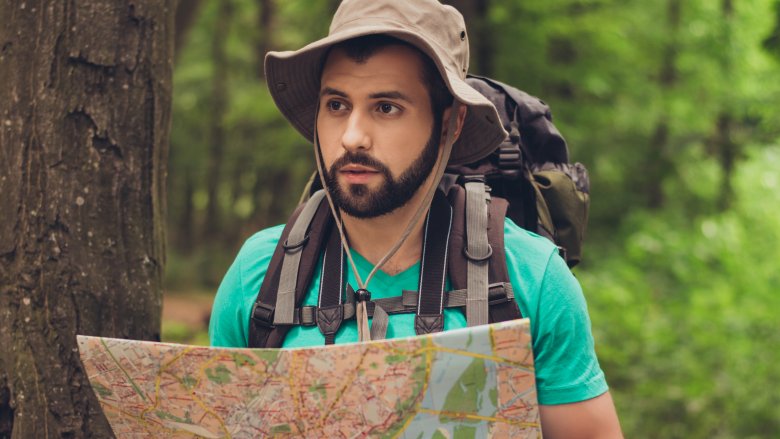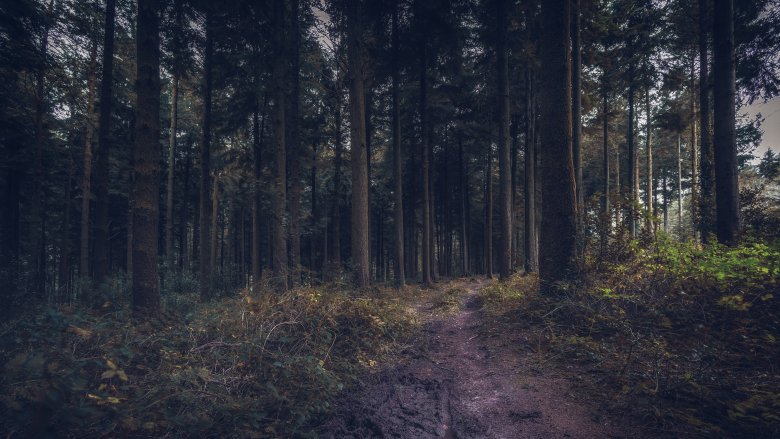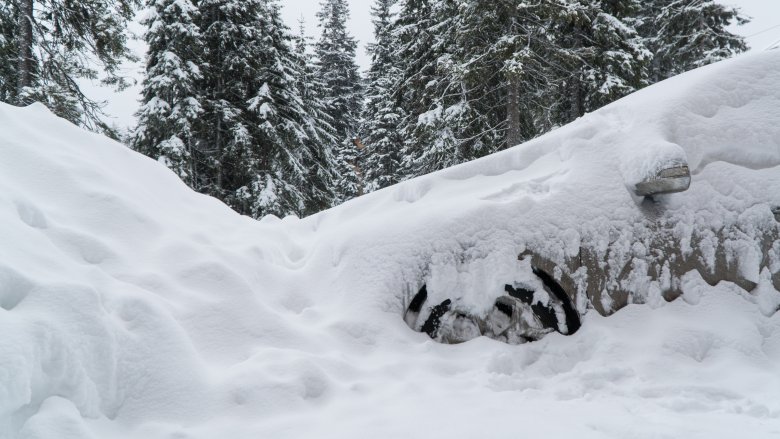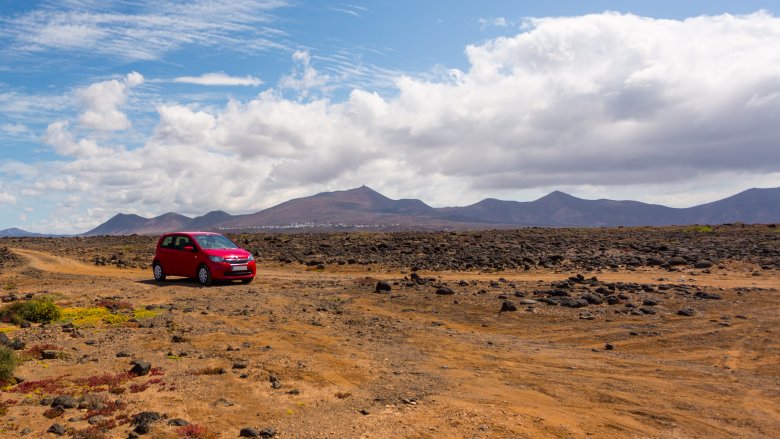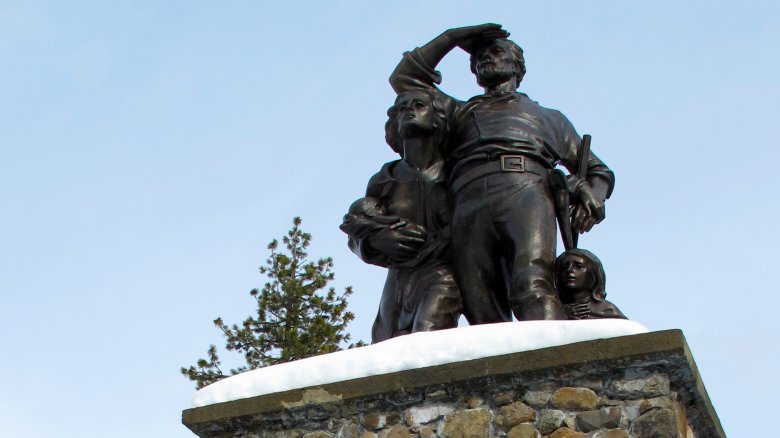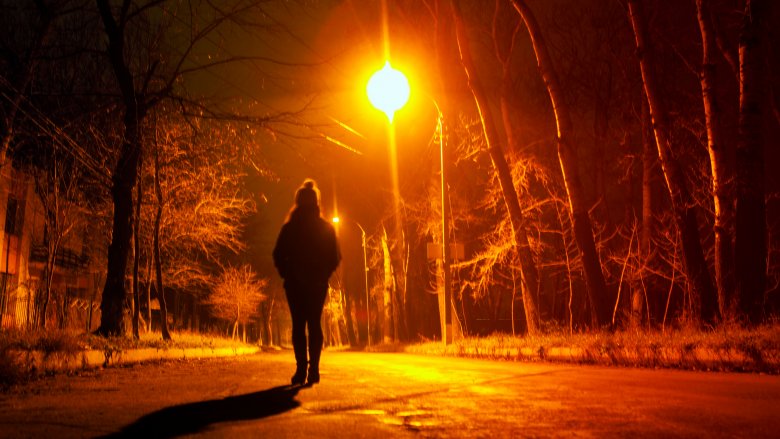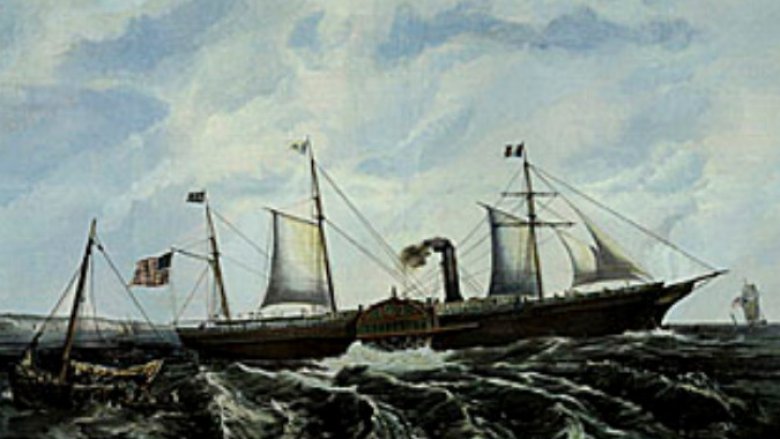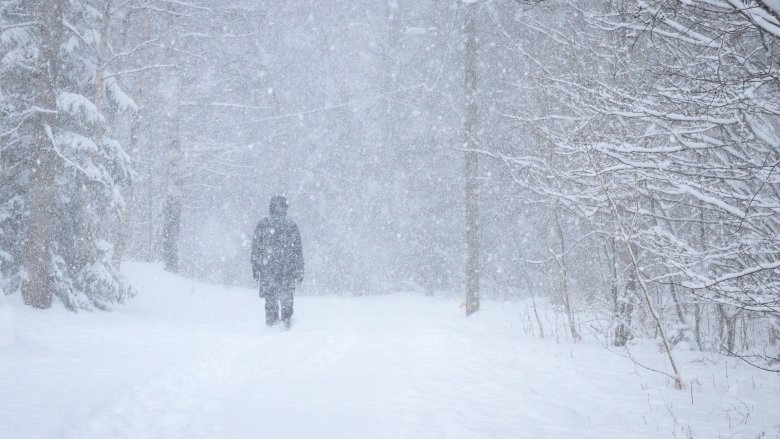People Who Paid The Ultimate Price By Taking A Shortcut
Hey, let's take a shortcut. How many times has someone said those words to you, and how many times have you had that sinking feeling ... uh, maybe I should not take this shortcut because maybe it's a lethally stupid idea?
Well, unfortunately, if the local news in just about any city in the world is any indication, your sinking feeling is pretty much spot-on. Shortcuts are frequently responsible for grave injury, suffering, and death. Yes, folks, the world clearly does not want you to take a shortcut, no matter how cheerily your GPS might say, "In a quarter-mile, turn right down the narrow, pothole-strewn, dark, forested path that clearly leads into the depths of the underworld." Because it might save you 15 minutes of driving, but it might also cost you your life.
And if you are a frequent shortcut-taker and you're thinking to yourself, "C'mon, how bad could it be?" then read on and know, shortcuts are a terrible idea. So please, just make a legal U-turn, if possible, and head back to the main road.
Don't take shortcuts through the woods
So mostly just don't be in Florida, because bad, bad things seem to happen in Florida. Yeah, they've got nice beaches and all but also they have packs of wild dogs that roam the forests and maul people to death. That's what happened to Melvin Olds Jr., a father of five and a grandfather, who decided to take a shortcut through a wooded area near Lake Placid about 100 miles from Orlando. Somewhere en route he encountered a pack of dogs, and unlike most dogs these particular canines were not friendly. Olds was found dead the same day, and his body had more than 100 dog bites on it.
According to CNN, authorities set traps for the offenders and captured six feral dogs that had mouths matching the wounds on Olds' body, but they'll need to actually compare the dogs' DNA to the DNA found on the victim's body before they'll know for sure they have got the right animals.
What's unclear is how no one seemed to know that there was a pack of potentially murderous feral dogs roaming those woods. Olds' fiancee recalled seeing dogs in their neighborhood but said she didn't feel threatened or intimidated by them. Still, dogs are cool when they're living with humans, but when they get into packs, well, just remember that it wasn't so long ago that our canine friends were actually wolves. So keep your distance.
Don't take shortcuts while hiking
When you're taking a shortcut through your own neighborhood, that's not so bad because at least you know where that path will ultimately take you. You might not be aware of the feral dog component of your shortcut, but at least you will know where the path leads and how soon it will get you home.
When you're hiking, well, there's a reason why all those signs tell you to stay on the trail. In August of 2019, 59-year-old David James and 64-year-old Marshall Cabe set out on a fishing expedition down Downey Creek trail east of Darrington, Washington. According to the Herald News, their route led them up steep hills, across creeks, and through thick underbrush. So that's cool, maybe they were in great shape and were experienced backwoodsmen, but they later told rescuers that they took a shortcut and "got turned around." The pair ran out of food and survived off of berries and mushrooms, and then eventually split up after they failed to agree on the best course of action.
This story has a happy ending — because the two men told family members where they were going and how long they would be gone, rescuers were able to find them before it was too late. Incidentally, Cabe was also lost in the same woods at the age of 14, but that time he and his similarly-lost friend were chased by three 10-foot-tall abominable snowman, so take that however you want to.
For the love of glob, don't listen to your stupid GPS
Hey, guess what, your GPS doesn't know everything. Especially when you're in the boonies. Because when you're in the boonies, well, your GPS thinks it knows stuff but it really, really doesn't. So when it tells you to turn down a road that looks really sketchy, don't. Your GPS doesn't know everything, and in fact, in the boonies it doesn't really know most things.
Here's a case in point: In December of 2019, a Bill Bymaster was near Kalispell, Montana, when his GPS suggested a shortcut that would have saved him about 45 minutes of driving. "My phone told me to take a turn that common sense would not have told you to take," he later told local news station KSL-TV. And yet, he decided that the GPS probably knew more than common sense did, so he turned down a gravel road and carried on for 18 miles until it started to snow. At one point he went down a hill, but his rental car was unable to manage the next hill up in the slippery conditions.
Bymaster spent the night in the car and tried to hike out the next morning, but he broke his leg. Still, he managed to walk four miles before collapsing. Happily, he was rescued by hunters who found his abandoned car and followed his tracks. So. When your GPS tells you to go down that sketchy gravel road, don't. Just don't.
If you have to die taking a shortcut, definitely do it in subzero temperatures
The amazing thing about freezing cold temperatures is that they can kill you, but for a few hours after they seem to have killed you, you're not really dead. Much like a piece of chicken in a freezer, you can be thawed out.
In this amazing story, 19-year-old Jean Hilliard took a shortcut near Lengby, Minnesota. It was cold, the road was icy, and her car slid into a ditch. She decided to walk to the nearby home of a friend and get help, but it was a couple of miles away and she barely made it. She collapsed before she could actually knock on the door. Her friend found her six hours later, with her eyes frozen open. He tried to put her in the cab of his truck but she was too stiff, so he had to take her to the hospital in a friend's car. She was so frozen, in fact, that the IV needle broke when they tried to put it in her arm. Doctors didn't give up on her though — they slowly warmed her body, and within hours she woke up.
So what the heck? According to MPR News, cold temperatures can actually put a person's body into a state of hibernation. Blood flow slows down and the body needs less oxygen. So just because someone looks like they've frozen to death doesn't necessarily mean they did. Crazy.
Don't take shortcuts if you're diabetic and elderly
In May of 2015, an elderly couple left a casino in Southern California, en route to their son's home for a Mother's Day dinner. It's not clear why 79-year-old Cecil Knutson and his 68-year-old wife Dianna Bedwell decided to look for a shortcut, but they did. Somehow, the couple got their car stuck on boulders, and because they were in a remote part of the Southern California mountains, there was no one around to help them out.
According to the New York Daily News, the couple lived on pie and oranges, and they used cups to collect rainwater. From tracks it's clear they tried to hike out at one point, but then gave up and returned to their vehicle.
Two weeks after they disappeared, a group of off-roaders found the couple, but it was too late for Knutson. Bedwell was severely dehydrated but recovered after she was airlifted to a hospital. Knutson and Bedwell were both diabetic, so Bedwell's survival amazed pretty much everyone. "It would be difficult for someone in good health to survive being in the wild for that long, let alone someone like her," said an officer who spoke about the incident at a press conference. "It's close to a miracle that she survived."
"Never take no cutofs and hury along as fast as you can"
One of the world's most infamous shortcuts was printed in a book called The Emigrants' Guide to Oregon and California. That's right, it was a travel book for wagon trains. And much like we modern people know that the GPS always tells the truth and never suggests a stupid and dangerous shortcut, a group of travelers that called themselves the Donner Party were also very sure that their handy little guidebook was telling the truth and not suggesting a stupid and dangerous shortcut.
According to History, the book claimed you could save 300 miles by leaving the Oregon route and traveling southwest to Salt Lake, and then carrying on from there to the San Francisco Bay. The group was convinced, so they left the well-traveled route and took the shortcut, and ended up wasting an extra month hacking through forests too thick for their wagons and getting their wheels stuck in the muddy salt flats near Salt Lake. By the time they arrived in the Sierras, it was winter, and it was snowing heavily. You know what happened next: The snowbound group ran out of food and resorted to cannibalism in order to survive.
At the end of the ordeal, 13-year-old Virginia Reed wrote to her cousin about the "trouble" the party had, ending with a sage piece of advice: "Never take no cutofs and hury along as fast as you can."
Don't take shortcuts through dark, deserted parks
In 2008, 14-year-old Jessica Knight was on her way to meet some friends when she decided to take a shortcut through Lancashire's Astley Park in Chorley, England. It was 5 pm, but the park was already dark and deserted, and there was someone evil lurking in it. Knight was attacked and stabbed 20 times in her neck, chest, and stomach. Her assailant left her to die. According to the Guardian, Knight was found by passers-by and brought to a hospital. Her life was saved after five hours of emergency surgery, but not without consequences. The teenager had a stroke and suffered permanent physical and psychological damage. She spent years enduring multiple surgeries and struggling with fatigue, and it was difficult for her to find employment. She still suffers with regular nerve pain.
Knight's assailant turned out the be a 21-year-old man who claimed he'd drank a half a bottle of whiskey and had no memory of the attack. He was later sentenced to life in prison.
This story does have a happy ending, though. Eleven years later Knight gave birth to a son — something no one was sure she'd be able to do given the amount of damage done to her body. "I am in a good place now and feel more secure in life," she told the Huffington Post. "I am looking forward to being a mum and seeing how it all unravels." Good for her.
19th-century people could take stupid shortcuts, too
Modern people don't have a monopoly on ill-advised shortcuts. According to the National Park Service, in 1853 the passenger vessel Winfield Scott was taking hopeful gold-prospectors from Panama to California when it ran into some trouble. Or more accurately, when its captain ran it into some trouble.
The steamship was carrying 300 passengers and crew, bags of mail, and also $1 million in gold, so you'd think some caution would have been advised, but no. Captain Simon Blunt wanted to save some time so he decided to cut through the Santa Barbara Channel. It was night and the fog was thick, but for some reason, it never occurred to the captain that he was being an idiot — he "knew his course" so he wasn't at all concerned about that million bucks. Or the people. Blunt sailed through the fog and then turned southeast, but oops, he wasn't actually past all the islands. The ship hit a rock, which put two holes in the bow, then the stern hit and the ship started to take on water.
Blunt ferried the passengers to the island of Anacapa, where they camped for a week until a passing ship saw the smoke from their campfire and rescued the women. Everyone else had to wait around for the ship to come back. Tellingly, the National Park Service doesn't actually say what became of the gold, which is probably quite good for tourism.
Winter shortcuts are just not great ideas in general
Here's a tip: When the main road is closed due to snowy conditions, you should probably not shortcut through the wilderness instead. But hey, when you have to get to a funeral, it's worth the risk. Unless you have a 4-month-old baby with you and then ... heck, it's still worth the risk.
No, no it's not. But that is exactly the tale of Jim and Jennifer Stolpa, who in December of 1992 took a shortcut across the Nevada desert en route to a funeral in Idaho. According to the Reno Gazette journal, when they learned that interstate 80 was closed, they decided to go down Route 299 instead, and somehow ended up stuck on a gravel road in Washoe County. For four days they sat in their truck while a blizzard howled relentlessly outside, hoping some other crazy person would come down the road and find them. When help did not arrive, they set out on foot, carrying their 4-month-old infant son. They hiked for 12 hours and still encountered no one, so Jim Stolpa left his wife and child in a natural snow cave under a manzanita bush and hiked another 30 miles, until he finally reached a house. By the time rescuers found Jennifer and her baby, she'd been in the cave for two days. Miraculously, all three survived.
Also, Neil Patrick Harris totally played Jim Stolpa in the made for TV movie, so, worth it.
Don't take shortcuts while intoxicated with someone you've only known three months
Generally speaking, it's hazardous to take shortcuts when you're intoxicated. But at least if you do it with a friend, you can help each other out, right? Well, evidently even that's not a guarantee.
According to the Telegraph, 23-year-old Charlotte Christodoulou was with 33-year-old Jamie Lloyd-Butler when the pair tried to take a shortcut through the grounds of primary school. It was 8 pm on a January evening, they were both intoxicated, and they were on their way to a friend's house. At the opposite end of the schoolyard, they encountered a 10-foot high fence. Lloyd-Butler scaled it, but Christodoulou was too disoriented. Now, most people would go back and help their friend find another way around, but not Lloyd-Butler, who'd only known Christodoulou for a few months. Instead, he just took off and left her. So why didn't she just go back the way she came? Well, she was evidently so intoxicated that she couldn't find her way back, and she died of hypothermia in a doorway. Diazepam, marijuana, cocaine, and morphine were found in her system. The coroner ruled "death by misadventure."
During an inquisition, Lloyd-Butler insisted that he hadn't actually left her, because he went back for her the next day. Okay, but that was like hours later, right? Seems like you were way too late to do anything to help her, dude. Nice move.
Don't cheat at the Boston Marathon
Okay, so the consequences of this shortcut weren't exactly "the ultimate price," unless you count permanent shame and humiliation as "the ultimate price." Fortunately, no one was injured or killed when Rosie Ruiz took a shortcut in April of 1980, but her actions reverberated for decades. According to Time Magazine, Rosie Ruiz was the first woman to cross the finish line in the 1980 Boston Marathon, a really remarkable accomplishment when you consider that the 26-year-old had only been training for 18 months, had finished in near-record time, and barely seemed to have broken a sweat. Her time of just over two and a half hours was impressive, and even more impressive, her hair was perfect.
It didn't take long for people to start asking questions. No one remembered seeing her along the first 25 miles of the course, and some witnesses said they watched her run onto the course from the sidelines about a mile from the finish line. She'd also cheated on the New York Marathon — she'd finished 24th and had done it by ... wait for it ... taking the subway.
So what happened to Rosie Ruiz? She lost her title, obviously, but she never faced criminal charges. Still, she'll forever be known as the lady who took a shortcut to win the Boston Marathon, and that's a pretty terrible legacy.
